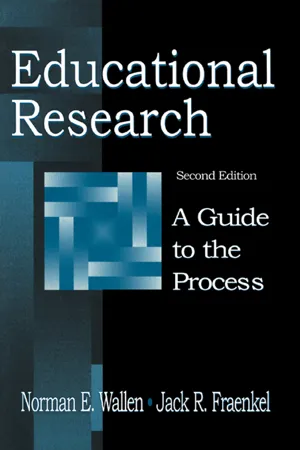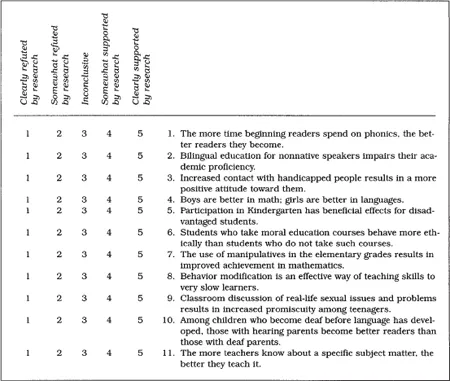![]()
PART ONE
BASIC CONCEPTS OF EDUCATIONAL RESEARCH
![]()
Chapter One
INTRODUCTION TO EDUCATIONAL RESEARCH
Education is a field about which everyone has opinions—often strong ones. Since virtually all of us have attended school, we know a lot about education through our own experiences. There are other fields in which we also have direct experience—medicine, for example. We have all received medical treatment of some kind, and most of us have been exposed to various home remedies to which we retain some attachment. Our opinions about health and medicine, however, are usually of a general nature: When we really need help or information, we are likely to rely on experts. This is much less the case in education, where we tend to think of ourselves as experts. We may complain about medical costs and may object to a specific treatment, but we do not try to tell physicians or hospitals what to do—as we frequently tell teachers and schools what they should be doing.
There are other reasons everyone is an expert on education. Schooling has a long-term and broad-gauged impact on people. During the 12 or more years when children are most susceptible to influence, schools affect not only their skills and specific knowledge but also their ideas, values, and social behavior. It is largely because schools are so important that people hold such strong views on what should take place in them.
None of this, we suppose, is news to you. We mention it here by way of making the case for the importance of research in education. A major purpose of educational research is to provide evidence to help people decide which opinions are correct—or at least more cor-rect. Decisions affecting the greatest resource that human beings have, their children, should be informed by knowledge, not by the loudest voices that can be heard.
A second purpose of educational research is to help us develop better ways to think about the field of education. Just as other forms of scientific research have changed our conceptions of both the physical world and our own psychological worlds, educational research can be expected to lead to more fruitful ways to think about schooling.
As an initial exercise, we ask you to think about the issues in Table 1.1 and how much is known about them. We are focusing not on your opinion of the issue itself, but rather on the extent to which you think knowledge exists to support or refute the statement.
Please indicate, on a scale of 1 to 5, the extent to which you think research has demonstrated the truth of each statement (5=the statement has been shown to be clearly supported by research; 1 =the statement has been shown to be clearly refuted by research; 3=research on the topic does not support either conclusion).
TABLE 1.1 Educational Research
AUTHORS’ COMMENTS
At present, there are relatively few issues in education that have been clearly resolved by research. However, each of the 11 statements in Table 1.1 has been addressed to some extent in the research literature. Although not every educator would agree with our assessment, we have rated the statements as follows:
1. Statement 1 is rated at 3. Despite a great deal of research on the topic, this statement can be neither clearly supported nor refuted. It is clear that phonics instruction is an important ingredient; what is not clear is how much time should be devoted to it.1
2. Statement 2 is rated at 2. Evidence is unclear as to whether or not bilingual methods are superior to English-only instruction, but several studies indicate no impairment of academic skills.2
3. Statement 3 is rated at 2. Evidence indicates that a more positive attitude results only if the nature of the contact is structured beforehand.3
4. Statement 4 is rated at 5. There is a considerable amount of evidence that these gender differences exist, though the reasons are not clear.4
5. Statement 5 is rated at 3. The evidence here is mixed. Participation in Kindergarten does appear to have beneficial effects on such students, but there is little evidence as to the relative effectiveness of various compensatory programs or on their cost-effecfiveness.5
6. Statement 6 is rated at 3, because there is relatively little research on ethical behavior.6
7. Statement 7 is rated at 4. The evidence is quite supportive of this method of teaching mathematics.7
8. Statement 8 is rated at 5, since there is a great deal of evidence to support the statement.8
9. Statement 9 is rated at 3, since not much evidence exists and the evidence that does exist is inconclusive.9
10. Statement 10 is rated at 1, since the findings of many studies refute the statement.10
11. Statement 11 is rated at 3, because the evidence is inconclusive despite the seemingly obvious fact that the teacher must know more than the students.11
The point of this exercise is not to review the state of current knowledge (some of our ratings might well be challenged), but rather to show that research can provide answers to some questions. The exercise also emphasizes the need for research on some of these (and other) issues about which little or no information exists or the information that does exist is inconclusive.
Notes
1. R.Calfee & R.Drum. 1986. Research on teaching reading. In M.C.Wittrock (Ed.). Handbook of research on teaching (3rd Ed.). New York: Macmillan, pp. 804–849.
2. S, Krashen. 1992. Bilingual education. In M.C.Alkin (Ed.), Encyclopedia of educational research (6th Ed.). New York: Macmillan, pp. 119–123.
3. S.L.Guskin & J.Gottlieb. 1992. Attitudes toward students with disabilities, In M.C.Alkin (Ed.). Encyclopedia of educational research (6th Ed.). New York: Macmillan, pp. 114–117.
4. R.M.Wolf. 1992. International test performance. In M.C.Alkin (Ed.). Encyclopedia of educational research (6th Ed.). New York: Macmillan, pp. 119–123.
5. E.L.McDili. 1992. Compensatory education. In M.C.Alkin (Ed.). Encyclopedia of educational research (6th Ed.), New York: Macmillan, pp. 208–221.
6. L.Nucci & J.Lee. 1992. Affective education. In M.C.Alkin (Ed.). Encyclopedia of educational research (6th Ed.). New York: Macmillan, pp. 42–45.
7. M.N.Suydam. 1986, February. Research report: Manipulative materials and achievement. Arithtnetic Teacher, 10:32.
8. J.W.Lloyd & A.C.Repp. 1992. Treatment methods for exceptional children and youth. In M.C.Alkin (Ed.). Encyclopedia of educational research (6th Ed.), New York: Macmillan, pp. 1430–1435.
9. P.A.Mosely. 1992. Sex education. in M. C.Alkin (Ed.). Encyclopedia of educational research (6th Ed.). New York: Macmillan, pp. 1206–1210.
10. C.M.Kampfe & A.G.Turecheck. 1987, March. Reading achievement of prelingually deaf students and its relationship to parental method of communication: A review of the literature. Americon Annals of the Deaf, 10: 11–15.
11. L.Shulman. 1986. Paradigms and research programs in the study of teaching. In M.C. Wittrock (Ed.). Handbook of research on teaching (3rd Ed.). New York: Macmillian, pp. 3–36.
Educational research can take many forms, including surveys, experiments, case studies, and ethnographies. Later in the book we return to these types of research, along with several others. At this point, we want to distinguish between empirical and nonempirical research, and basic and applied research.
Empirical Versus Nonempirical Research
Empirical research is research that involves the collection of firsthand information. Nonempirical research does not involve the collection of information at firsthand. Thus, research that consists of locating and comparing references on a particular topic—the customary term paper—is not an example of empirical research. If a researcher is interested, for example, in finding out if girls read better than boys, he or she could locate and compare studies conducted during the past 10 years as well as the opinions of authorities in reading. Although valuable and necessary, such research is not empirical. In order to do empirical research on this issue, a researcher would have to obtain firsthand information on the reading skills of an identified group and compare the performance (probably as indicated by scores on a reading test) of boys with girls. In this book, we are concerned primarily with empirical research; literature research is discussed as a necessary background for conducting empirical research.
Here is an opportunity to check your understanding of the distinction between empirical and nonempirical research. In the list of research topics that follows, identify which are examples of empirical research and which are examples of nonempirical research.
1. A study of the effectiveness of a social learning program on the employability of severely disabled adults.
2. The relationship between television watching and school achievement—a review of the literature.
3. A reanalysis of the evidence on school effectiveness.
4. The relationship between self-esteem and age at school entrance of fourth-grade students in the San Francisco Unified School District.
5. Logical inconsistencies in the writings of Sigmund Freud.
6. A comparison of the effectiveness of behavior therapy as compared with client-centered therapy in homes for adolescent runaways.
AUTHORS’ COMMENTS
Topics 1, 4, and 6 are examples of empirical research in that they clearly indicate that information will be obtained directly on the subjects in the study (severely disabled adults, fourth-grade students, and adolescent runaways). Topics 2, 3, and 5, on the other hand, are examples of non-empirical research. Topic 2 deals with a review of previous research that does not involve the direct collection of data. Topic 5 is a logical analysis of written material, but does not involve any raw data. Topic 3 implies that previously collected data are to be reexamined in a new way.
Basic Versus Applied Research
The distinction between basic and applied research is as follows:
Basic | Applied |
| |
Results apply to a great many people and situations. | Results are applicable only to a specific group of people in a particular situation. |
Results are related to general theory or to a general field of knowledge. | Results are not necessarily related to a broader field of knowledge. |
Results need not have immediate or even clear implications for practice. | Results must have immediate and clear implications for practice. |
An example of basic research is an investigation of the relative effects of heredity and environment on academic performance. An example of applied research is a study that seeks the opinions of a school faculty toward merit pay. Many studies, of course, do not fit neatly into either of these categories, but fall on a continuum between the two extremes. Thus, a study of relaxation techniques as a method of increasing attention to task on the part of learning-handicapped students in a particular classroom has clear implications for that group...





